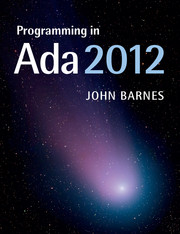Summary
Ada 2012 is a comprehensive high level programming language especially suited for the professional development of large or critical programs for which correctness and robustness are major considerations. In this introductory chapter we briefly trace the development of Ada 2012 (and its predecessors Ada 83, Ada 95, and Ada 2005), its place in the overall language scene and the general structure of the remainder of this book.
Standard development
Ada 2012 is a direct descendant of Ada 83 which was originally sponsored by the US Department of Defense for use in the so-called embedded system application area. (An embedded system is one in which the computer is an integral part of a larger system such as a chemical plant, missile or dishwasher.)
The story of Ada goes back to about 1974 when the United States Department of Defense realized that it was spending far too much on software, especially in the embedded systems area. To cut a long story short the DoD sponsored the new language through a number of phases of definition of requirements, competitive and parallel development and evaluation which culminated in the issue of the ANSI standard for Ada in 1983. The team that developed Ada was based at CII Honeywell Bull in France under the leadership of Jean D Ichbiah.
The language was named after Augusta Ada Byron, Countess of Lovelace (1815–52). Ada, the daughter of the poet Lord Byron, was the assistant and patron of Charles Babbage and worked on his mechanical analytical engine. In a very real sense she was therefore the world's first programmer.
Ada 83 became ISO standard 8652 in 1987 and, following normal ISO practice, work leading to a revised standard commenced in 1988. The DoD, as the agent of ANSI, the original proposers of the standard to ISO, established the Ada project in 1988 under the management of Christine M Anderson. The revised language design was contracted to Intermetrics Inc. under the technical leadership of S Tucker Taft. The revised ISO standard was published on 15 February 1995 and so became Ada 95.
The maintenance of the language is performed by the Ada Rapporteur Group (ARG) of ISO/IEC committee SC22/WG9. The ARG under the leadership of Erhard Plödereder identified the need for some corrections and these were published as a Corrigendum on 1 June 2001.
- Type
- Chapter
- Information
- Programming in Ada 2012 , pp. 3 - 10Publisher: Cambridge University PressPrint publication year: 2014

